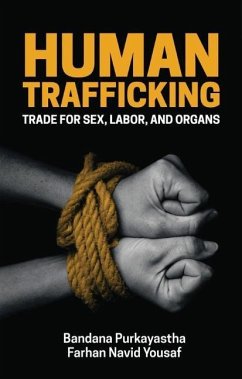The last few decades have seen a huge increase in attention paid to the trafficking of human beings, often referred to as modern-day slavery. International and national policies and protocols have been developed and billions of dollars spent to combat the issue and protect trafficking victims. Yet it continues to flourish and human beings, in both the Global North and the Global South, continue to be degraded to the level of commodities and smuggled across borders for profit.
Drawing upon feminist and human rights approaches to trafficking, this book links the worlds of policy, protocols, and social structures to the lived experience and conditions of trafficked people. Recognizing that trafficking for sex, labor, and body parts often overlaps in a broader context shaped by poverty, violence, and shrinking access to rights, the authors offer a more thoroughgoing account of this social problem. Only with such an integrated approach can we understand the exploitative conditions that make people vulnerable to trafficking, and the progress - as well as gaps - in initiatives seeking to address it.
Hinweis: Dieser Artikel kann nur an eine deutsche Lieferadresse ausgeliefert werden.
Drawing upon feminist and human rights approaches to trafficking, this book links the worlds of policy, protocols, and social structures to the lived experience and conditions of trafficked people. Recognizing that trafficking for sex, labor, and body parts often overlaps in a broader context shaped by poverty, violence, and shrinking access to rights, the authors offer a more thoroughgoing account of this social problem. Only with such an integrated approach can we understand the exploitative conditions that make people vulnerable to trafficking, and the progress - as well as gaps - in initiatives seeking to address it.
Hinweis: Dieser Artikel kann nur an eine deutsche Lieferadresse ausgeliefert werden.
"This book is a major contribution to research and policy making on human trafficking. The authors narrate through the dark side of globalization but offer hope and a way forward for a trafficking-free world."
Yak1n Ertürk, Middle East Technical University, Turkey, and former UN Special Rapporteur on Violence Against Women
"Purkayastha and Yousaf offer important sociological insights by carefully considering the challenges and complexities in connecting frameworks, protocols, and policies to the contexts and conditions that contribute to the persistence and change in addressing the social problem of human trafficking."
Margaret Abraham, Hofstra University, USA, and former President of the International Sociological Association
"Worth mentioning here (and deserving of praise), is the authors' particular focus on the literature coming from the Global South, as these contributions have been mostly sidelined, if not neglected in the Anglo-centric counter-trafficking literature. The book also provides narratives (or 'vignettes') of victims/survivors of trafficking, a practice rare in the literature and encouraged by the international community. Such an approach should be both welcomed and reproduced in the literature in the future."
Border Criminologies
Yak1n Ertürk, Middle East Technical University, Turkey, and former UN Special Rapporteur on Violence Against Women
"Purkayastha and Yousaf offer important sociological insights by carefully considering the challenges and complexities in connecting frameworks, protocols, and policies to the contexts and conditions that contribute to the persistence and change in addressing the social problem of human trafficking."
Margaret Abraham, Hofstra University, USA, and former President of the International Sociological Association
"Worth mentioning here (and deserving of praise), is the authors' particular focus on the literature coming from the Global South, as these contributions have been mostly sidelined, if not neglected in the Anglo-centric counter-trafficking literature. The book also provides narratives (or 'vignettes') of victims/survivors of trafficking, a practice rare in the literature and encouraged by the international community. Such an approach should be both welcomed and reproduced in the literature in the future."
Border Criminologies








